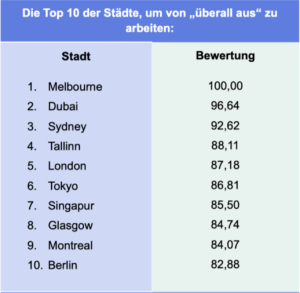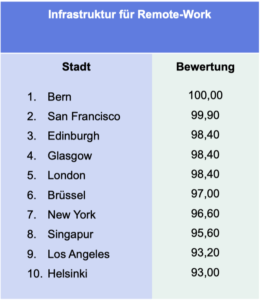„The top three remote work cities are hardly surprising, but the European cities in the top 10 are more so. And the winners and losers in individual categories such as home office rent or air, noise and light pollution are particularly exciting.” Sylvie Konzack
From Dubai to the Canary Islands – already in 2020 and early 2021, some destinations attracted attention with special remote-work offers and lured business travellers and leisure guests to stay longer in a foreign place.
A recent study by the accommodation platform Nestpick shows which cities are currently the most attractive for digital nomads. For this purpose, Nestpick selected 75 major cities worldwide that are often described as the “most liveable” or have recently been particularly committed to welcoming remote workers from all over the world. The cities were analysed in three broad categories: cost & infrastructure, legislation & freedoms, and quality of life.
 As a result, Melbourne took first place in the overall index, even though entry opportunities are currently difficult due to the strict Covid 19 requirements. The Australian metropolis scored particularly well on quality of life factors such as safety, healthcare and cultural and leisure opportunities. Melbourne also scored highly for its remote work infrastructure and its offer of a special visa for digital nomads.
As a result, Melbourne took first place in the overall index, even though entry opportunities are currently difficult due to the strict Covid 19 requirements. The Australian metropolis scored particularly well on quality of life factors such as safety, healthcare and cultural and leisure opportunities. Melbourne also scored highly for its remote work infrastructure and its offer of a special visa for digital nomads.
Melbourne is followed by Dubai and once again Australia with Sydney. Rank 4 and 5 in the index are the first European cities: Tallinn and London. The first German city is Berlin in 10th place. New York, on the other hand, ranks 20th, Copenhagen 70th (graphic left: Nestpick).
High costs in the USA
According to the study, only ten of the 75 cities surveyed offer visas for digital nomads – six of them in Europe: Zagreb, Prague, Lisbon, Reykjavik, Tallinn and Athens. They are joined by Sydney, Melbourne, Dubai and Mexico City.
On average, the rent for a home office in Rio de Janeiro is the cheapest at 119 euros a month, followed by Saint Petersburg (139 euros) and Istanbul (169 euros). In comparison, the most expensive monthly home office rent is in San Francisco (1,736 euros), where the cost of living is also the highest, as well as in New York and Singapore.
 No taxes are paid by remote workers in Dubai, the lowest in Saint Petersburg and Hong Kong. In the evaluation of the greatest security, freedom and rights for remote workers, Auckland, Helsinki and Bern scored best. In addition, Canada with Toronto and Vancouver as well as Sydney were convincing in the evaluation as the best healthcare system.
No taxes are paid by remote workers in Dubai, the lowest in Saint Petersburg and Hong Kong. In the evaluation of the greatest security, freedom and rights for remote workers, Auckland, Helsinki and Bern scored best. In addition, Canada with Toronto and Vancouver as well as Sydney were convincing in the evaluation as the best healthcare system.
In general, Bern, San Francisco and Edinburgh are convincing in terms of infrastructure for remote work (graphic on the right: Nestpick). Reykjavik, Toulouse and again Bern score best in terms of WLAN speed, while Marrakech, Medellin in Colombia and the island of Bali score worst here.
According to the study, Las Palmas on Gran Canaria offers the best weather conditions, while Bangkok has the worst. Tallinn has the best values in terms of noise, air and light pollution, with Edinburgh and Honolulu in second and third place. In a comparison of the selected remote work cities, Shanghai and Mexico City have the highest noise, air and light pollution.

Purchasing power migrates far away
“The evolving reality of working-from-anywhere opens up the possibility of existing roles or new opportunities from afar,” points out Omer Kucukdere, founder and CEO of Nestpick, who, accelerated by Corona, sees this as “a natural continuation of international travel”. The ranking aims to demonstrate which global cities make this process easiest for remote workers and are therefore likely to attract the best talent from around the world.
“Our study also shows that technology and employers have advanced faster than infrastructure, and that there are still many legal hurdles for migrants who want to bring their jobs with them,” says Omer Kucukdere. In the process, people with high incomes are also leaving business-focused cities to live in places with a better everyday lifestyle – and taking their purchasing power with them. “This trend will only increase over time,” the founder is convinced. “So we expect more and more cities to adapt to this new way of working to benefit from the economic boost these workers bring to the economy.”
Sylvie Konzack …
 was somewhat surprised why the Scandinavian cities only follow in the later ranks and why “work-hungry” metropolises like Tokyo are again in the top 10. When it comes to remote work, however, many criteria are obviously mixed up and previous pigeonholes are dissolved.
was somewhat surprised why the Scandinavian cities only follow in the later ranks and why “work-hungry” metropolises like Tokyo are again in the top 10. When it comes to remote work, however, many criteria are obviously mixed up and previous pigeonholes are dissolved.
Fotos: © iStock.com_LouisHiemstra, © iStock.com_Gulcin Ragiboglu, graphics: © Nestpick




